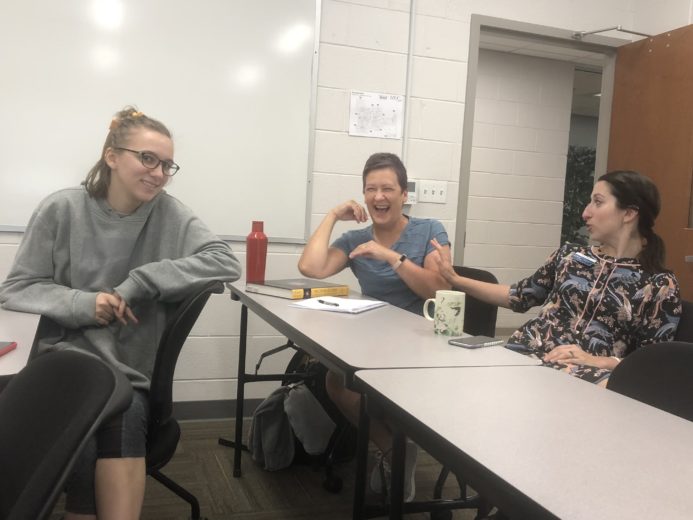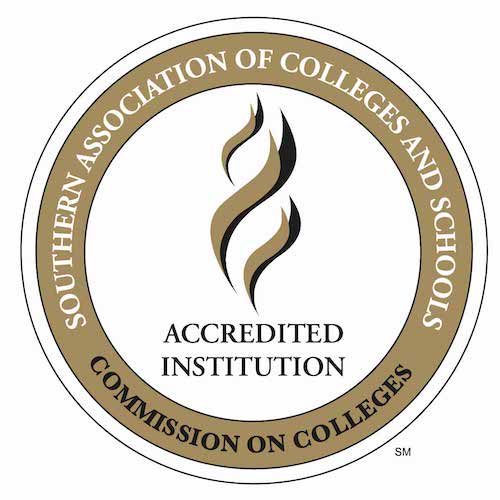For Immediate Release:
August 17, 2018
Primary Media Contact:
Sally Voth
Public Relations Specialist
[email protected]
Phone: 540-868-7134

It may have the word “bureau” in its name, but there’s no red tape involved when it comes to participating in one of the newest clubs on Laurel Ridge’s Middletown Campus.
The Bureau of Neuro-Diversity (BOND) meets at noon every Thursday in Cornerstone Hall, Room 215.
While it’s billed as a club that creates a nurturing, socially-supportive environment for neuro-diverse students – which includes those on the autism spectrum, as well as people with attention-deficit disorder, obsessive compulsive disorder, reactive attachment disorder, post-traumatic stress disorder and other disorders – it is open to “neuro-typicals” as well.
There are about a dozen BOND members; it became an official club last spring.
“A number of the students on the autism spectrum had been talking about the need for a support group on campus for several years,” says Anatomy and Physiology Professor Ramon Selove, the club’s advisor. “It took a while to get started because autistic people are notoriously difficult to organize.
“On the other hand, another common trait among people with autism is that once we establish a routine it’s easy to stick with it. So, having established a routine of meeting every week, people sort of incorporate that into their lives.”
The club’s moniker was chosen because “autism is, at its heart, a bonding disorder,” he says.
“Central to its treatment and management is practice at bonding with other people, making friends,” Selove, who is on the autism spectrum, says. “This is why we felt the need for a social club. We chose ‘Neuro-diversity’ because it isn’t only people on the autism spectrum who need this sort of support. There are many neurologically-divergent conditions that have similarities in their neurophysiology, and benefit from similar supports.”
During one of the club’s July meetings, four people joined Selove and his service dog, a chocolate lab named Coriander, in Room 215. There are about a dozen club members.
Student Emma Delaney hopes to become a nurse, and is taking prerequisites and other classes in pursuit of that goal.
“I thought the club sounded nice, so I went to the next meeting, and have kept going,” she says.
While Delaney doesn’t think she is autistic, she says she does have difficulty in talking to others.
Selove, who has taught at Laurel Ridge for 28 years, says that regardless of whether or not Delaney is on the autism spectrum, she does have some of the positive traits shared by those who are. The same is true of RN student Patricia Ramsey.
The shared traits they exhibit include sensory hyper-sensitivity, meaning that concentration can be disrupted by sensory input; on the flip side, this can lead to the ability to hyper-focus, which helps in problem solving and concentration; and a high degree of associative thinking.
This associative thinking was on display during the July meeting when the topics of conversation flowed quickly and humorously, covering everything from “Game of Thrones,” to a member’s recent vacation, to a memorable class exercise of Selove’s.
Disability services coordinator Viviane Meder attends the meetings because she enjoys the company. She also makes new students aware of the club.
“BOND is interesting, and I think it’s important to understand autism,” Ramsey says. “I think the more we understand it, maybe we can make social interactions a little easier for those who have autism.”
“There are some people who really enjoy being around autistic people,” Selove says. “There are plenty of people who hate being around us – we can be really irritating to some people. But, there are some who really like being around us because we’re interesting.”
Biology student Daniel Rioux was diagnosed 10 years ago, when he was 21. Inspired by Selove, Rioux hopes to transfer to Virginia Commonwealth University and study physiology.
“A lot of it for me is being able to share the experience of being autistic with people, and also act as kind of a guide or mentor for younger members in the club,” he says. “There are experiences I can pass along that can be very helpful.”
Sometimes, the club has specific business to cover, according to Selove, “but mostly, our reason for being is to support each other.”
“Many autistic people don’t get a chance to socialize and have group connections,” Rioux says. “One of the big emphases of this club is just to provide that space, and it feels easy.
“Bonding for autistics is very unique.”
Selove adds, “It tends to be less frequent, but deeper. Autistics usually have fewer friends, but they tend to be close long-term.”
At the request of the club, the Middletown Campus is getting its first “sensory room,” which will be a haven for those who are neuro-diverse and in need of a safe place to “meltdown.” It will be stocked with noise-cancelling headphones, weighted blankets, a rocking chair, bean bag chairs, and numerous fidget spinners and other manipulatives.
*************************
Founded in 1970, Laurel Ridge Community College is a multi-campus public institution of higher education. With three locations — Middletown, Warrenton, and Luray-Page County — the College serves eight localities in the Shenandoah Valley and northern Piedmont regions. The localities are the counties of Clarke, Fauquier, Frederick, Page, Rappahannock, Shenandoah and Warren and the city of Winchester. Laurel Ridge offers more than 75 associate degree and certificate programs in a wide variety of disciplines, in addition to providing access to bachelor’s, master’s and doctoral degree programs offered on site by a four-year institution. Laurel Ridge also serves the business community by offering workforce preparation programs for employees and employers. Laurel Ridge serves more than 9,000 unduplicated credit students and more than 11,000 individuals in professional development and business and industry courses annually.
 Laurel Ridge Community College is accredited by the Southern Association of Colleges and Schools Commission on Colleges (SACSCOC) to award associate degrees. Laurel Ridge Community College also may offer credentials such as certificates and diplomas at approved degree levels. Questions about the accreditation of Laurel Ridge Community College may be directed in writing to the Southern Association of Colleges and Schools Commission on Colleges at 1866 Southern Lane, Decatur, GA 30033-4097, by calling (404) 679-4500, or by using information available on SACSCOC’s website (www.sacscoc.org).
Laurel Ridge Community College is accredited by the Southern Association of Colleges and Schools Commission on Colleges (SACSCOC) to award associate degrees. Laurel Ridge Community College also may offer credentials such as certificates and diplomas at approved degree levels. Questions about the accreditation of Laurel Ridge Community College may be directed in writing to the Southern Association of Colleges and Schools Commission on Colleges at 1866 Southern Lane, Decatur, GA 30033-4097, by calling (404) 679-4500, or by using information available on SACSCOC’s website (www.sacscoc.org).
Laurel Ridge Community College is an equal opportunity institution providing educational and employment opportunities, programs, services, and activities. Laurel Ridge shall promote and maintain equal employment and educational opportunities without regard to race, color, religion, disability, sex, sexual orientation, gender identity, ethnicity, marital status, pregnancy, childbirth or related medical conditions including lactation, age (except when age is a bona fide occupational qualification), status as a veteran, national origin, or other non-merit factors. Laurel Ridge also prohibits sexual misconduct including sexual violence or harassment. Inquiries may be directed to the Associate Vice President, Human Resources, [email protected], 173 Skirmisher Lane, Middletown, VA 22645, 540-868-7226.
Laurel Ridge Community College was known as Lord Fairfax Community College until June 2022. For consistency purposes, the college will be referenced as Laurel Ridge going forward.
###
